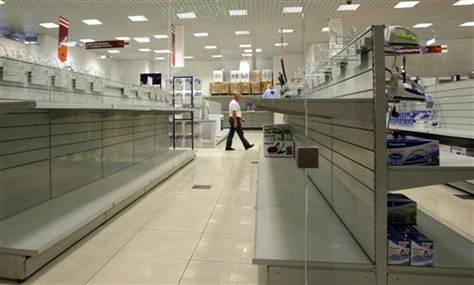
Belarus Devalues Currency amid Growing Isolation
Publication: Eurasia Daily Monitor Volume: 8 Issue: 110
By:

Belarusian President, Alyaksandr Lukashenka, is a man under pressure. Assailed by Western powers for his harsh treatment of former presidential candidates and protestors, he also faces mounting economic problems that have led to the devaluation of the national currency. At the same time, high rates of inflation and what he describes as “panic buying” of consumer goods, salt, sugar, and other products have added to his difficulties. In an address to the Belarusian government, he laid the blame on his Prime Minister and National Bank Chairman, as well as the Russian media and foreign enemies.
On May 26, the Lenin District Court in Minsk announced sentences for two presidential candidates found guilty of organizing a mass riot after the December 19 presidential elections. Mikalay Statkevich, a seasoned leader of the Social Democratic Party, received a six-year sentence in a medium security penal colony. Dzmitry Uss, a virtual unknown political entity prior to the elections, received five years and six months. The two announcements follow a five-year verdict for Andrei Sannikau, the leading opponent of Lukashenka according to official results. A host of other activists have received sentences of two to four years (www.charter97.org, May 26).
The harsh sentences have led to a strong critique of the Lukashenka regime from the EU, which has extended travel bans on Belarusian leaders, and especially from US President Barack Obama, enunciated at a news conference in Warsaw, held alongside Polish Prime Minister Donald Tusk. President Obama described the internal situation in Belarus as “unacceptable,” and announced his intention to expand sanctions. The Polish Prime Minister commented that his country shared the view that the Lukashenka regime “had no future in Europe” (www.naviny.by, May 29; RIA Novosti, May 29).
President Obama’s outspoken attack comes at a time when the Belarusian leader is facing his most acute problems of his 17 years in office. After much procrastination, the National Bank of Belarus devalued the currency on May 24 from just over BR 3,000 to the dollar to BR 4,930 in an attempt to curtail the high demand for foreign currency and the mass buying of consumer goods, as well as sugar, sunflower, oil, salt, and other products. Inflation rose 15 percent in the first five months of 2011. A decree issued by the Ministry of Economics on May 25 announced the rise in the price of sugar by almost 40 percent and that of vodka by 10 percent from May 28 (Belorusy i Rynok, May 29).
Lukashenka has also been concerned by the attitude of Russia, which agreed on June 4 to provide a loan of $3 billion – to be paid in tranches over the next two years, and two-thirds of which emanates from the Eurasian Economic Union’s Emergency Fund. An initial sum of $800 million is to be provided within 8-10 days. Russian Finance Minister, Aleksey Kudrin, confirmed that in return for the loan, Belarus must sell off $7.5 billion worth of state assets (Belapan, June 5). Hitherto, Lukashenka has rejected suggestions that Belarus would sell profitable state-owned companies. He is also seeking alternative sources of support. On June 1, his Prime Minister Mikhail Myasnikovich confirmed that the Council of Ministers and National Bank have also requested a loan of $3.5 billion to $8 billion from the IMF (www.naviny.by, June 5).
In his address to the government on May 27, Lukashenka alternated between disarming frankness and vindictiveness toward those he holds responsible for his current predicament. Citing a recent public survey, he acknowledged that since last March, the populace perceives a worsening of the social and economic situation in the country. The basic cause is the sharp rise in prices, which, he states, concern the people twice as much as acts of terrorism – a reference to the explosion at the central metro station in Minsk on April 11. Twenty percent of citizens are disturbed by the reduction of wages (in real terms) and 20 percent by their inability to purchase hard currency (SB-Belarus’ Segodnya, May 28, 29).
Concerning who is responsible for the current problems, Lukashenka noted that according to the opinion poll, 25 percent blamed them on the citizens themselves, 24 percent on the world financial crisis, 20 percent on the government and local organs of authority, and 10 percent on the president. He added his voice to the 25 percent who blamed citizens, but also commented on the flawed actions of the Prime Minister Mikhail Myasnikovich and the Chairman of the National Bank, Pyotr Prakapovich and threatened to fire them if the situation did not improve “within one week.” He also declared his intention to place bans on irresponsible reporters for Russian media who were creating hysteria and panic in Belarus.
The fragility of Lukashenka’s position is evident. On May 27, Russian Prime Minister Vladimir Putin, announced that Gazprom, which currently owns 50 percent of shares of the company Beltransgaz, is finalizing plans to purchase the remaining 50 percent for $2.5 billion (ITAR-TASS, May 27). Russia purchased the first 50 percent as part of a deal on gas prices made with Belarus four years ago (Kommersant, May 19, 2007).
Meanwhile, Belarusian Finance Minister Andrei Kharkovets, openly contradicted Lukashenka, saying that the government had no intention of altering its privatization plans and arrangements made previously with Russia (Belarusian Telegraph Agency, May 27). However, it is not unusual for the president to make some statements entirely for a national audience while allowing his government to do the opposite.
Lukashenka has been an architect of his own troubles by inexplicably alienating the West through his punishment of former presidential opponents and activists at a time when he needs desperately to reduce his growing dependence on loans from Moscow and economic subjugation to powerful Russian companies.




